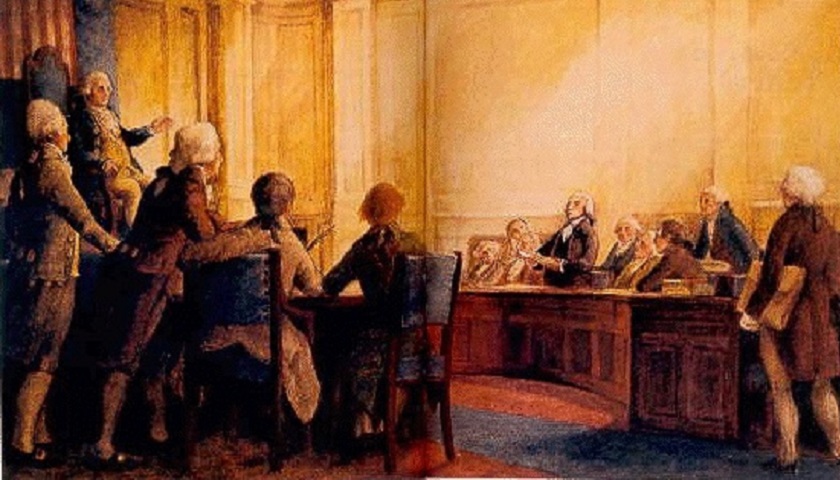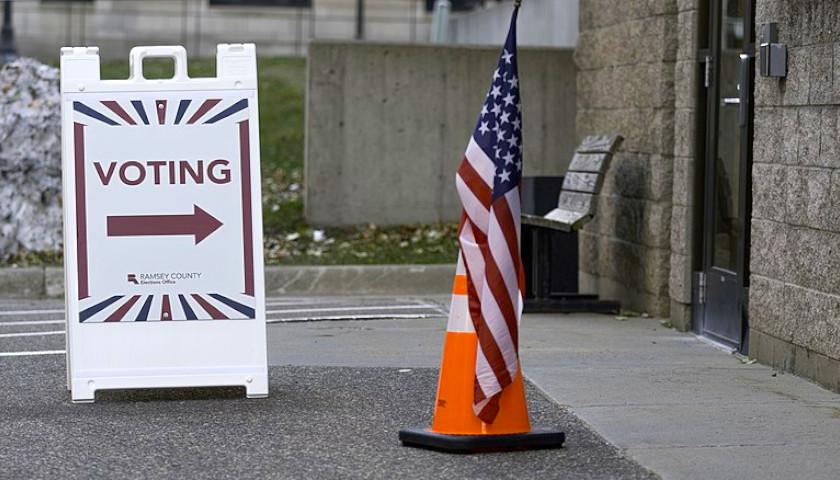This is the seventeenth of twenty-five weekly articles in The Tennessee Star’s Constitution Series. Students in grades 8 through 12 can sign up here to participate in The Tennessee Star’s Constitution Bee, which will be held on September 23.
As we wrote about extensively earlier in this series, the foundational concept of Federalism in the United States Constitution is most specifically outlined in the Tenth Amendment:
The powers not delegated to the United States by the Constitution, nor prohibited by it to the States, are reserved to the States respectively, or to the people.
One aspect of the Tenth Amendment very relevant to contemporary issues is that it makes absolutely no mention of reserving any powers not delegated to the federal government to cities or counties that are subdivisions of State governments.
Indeed, the Constitution grants powers to only three entities–(1) the federal government, which it grants limited and enumerated powers, (2) the State governments, which along with (3) the people–and by that the Founders meant each of us as individual citizens–have all the powers not specifically delegated to the federal government reserved to them.
The text of the Constitution, clearly enumerates thirty-three specific powers granted to the national government, as we explained in Chapter Four:
Article 1, Section 8 of the Constitution enumerates 19 specific powers granted to the legislative branch of the national government.
Article II, Sections 2 and 3 of the Constitution enumerates 13 specific powers granted to the executive branch of the national government.
Article III, Sections 1 and 2 of the Constitution enumerates 1 specific power granted to the judicial branch of the national government.
The important point to remember about the Tenth Amendment is this: If a power is not one of these 33 specific powers granted to the national government, it is reserved to the States, or to the people.
Article II, Sections 2 and 3 enumerate these 13 specific powers granted to the president:
Section 2
The President shall be (1) Commander in Chief of the Army and Navy of the United States, and (2) of the Militia of the several States, when called into the actual Service of the United States; (3) he may require the Opinion, in writing, of the principal Officer in each of the executive Departments, upon any Subject relating to the Duties of their respective Offices, and (4) he shall have Power to grant Reprieves and Pardons for Offences against the United States, except in Cases of Impeachment.(5) He shall have Power, by and with the Advice and Consent of the Senate, to make Treaties, provided two thirds of the Senators present concur; and (6) he shall nominate, and by and with the Advice and Consent of the Senate, shall appoint Ambassadors, other public Ministers and Consuls, Judges of the supreme Court, and all other Officers of the United States, whose Appointments are not herein otherwise provided for, and which shall be established by Law: but the Congress may by Law vest the Appointment of such inferior Officers, as they think proper, in the President alone, in the Courts of Law, or in the Heads of Departments.
(7) The President shall have Power to fill up all Vacancies that may happen during the Recess of the Senate, by granting Commissions which shall expire at the End of their next Session.
Section 3
He shall from time to time (8) give to the Congress Information of the State of the Union, and recommend to their Consideration such Measures as he shall judge necessary and expedient; he may, on extraordinary Occasions, (9) convene both Houses, or either of them, and in Case of Disagreement between them, with (10) Respect to the Time of Adjournment, he may adjourn them to such Time as he shall think proper; he (11) shall receive Ambassadors and other public Ministers; he shall (12) take Care that the Laws be faithfully executed, and shall (13) Commission all the Officers of the United States.
Article I, Section 8 enumerates these 19 specific powers granted to the Congress:
Section 8
The Congress shall have Power (1) To lay and collect Taxes, Duties, Imposts and Excises, (2) to pay the Debts and (3) provide for the common Defence and general Welfare of the United States; but all Duties, Imposts and Excises shall be uniform throughout the United States;
(4) To borrow Money on the credit of the United States;
(5) To regulate Commerce with foreign Nations, and among the several States, and with the Indian Tribes;
(6) To establish an uniform Rule of Naturalization, and uniform Laws on the subject of Bankruptcies throughout the United States;
(7) To coin Money, regulate the Value thereof, and of foreign Coin, and fix the Standard of Weights and Measures;
(8) To provide for the Punishment of counterfeiting the Securities and current Coin of the United States;
(9) To establish Post Offices and post Roads;
(10) To promote the Progress of Science and useful Arts, by securing for limited Times to Authors and Inventors the exclusive Right to their respective Writings and Discoveries;
(11) To constitute Tribunals inferior to the supreme Court;
(12) To define and punish Piracies and Felonies committed on the high Seas, and Offences against the Law of Nations;
(13) To declare War, grant Letters of Marque and Reprisal, and make Rules concerning Captures on Land and Water;
(14) To raise and support Armies, but no Appropriation of Money to that Use shall be for a longer Term than two Years;
(15) To provide and maintain a Navy;
(16) To make Rules for the Government and Regulation of the land and naval Forces;
(17) To provide for calling forth the Militia to execute the Laws of the Union, suppress Insurrections and repel Invasions;
(18) To provide for organizing, arming, and disciplining, the Militia, and for governing such Part of them as may be employed in the Service of the United States, reserving to the States respectively, the Appointment of the Officers, and the Authority of training the Militia according to the discipline prescribed by Congress;
(19) To exercise exclusive Legislation in all Cases whatsoever, over such District (not exceeding ten Miles square) as may, by Cession of particular States, and the Acceptance of Congress, become the Seat of the Government of the United States, and to exercise like Authority over all Places purchased by the Consent of the Legislature of the State in which the Same shall be, for the Erection of Forts, Magazines, Arsenals, dock-Yards, and other needful Buildings;—And
To make all Laws which shall be necessary and proper for carrying into Execution the foregoing Powers, and all other Powers vested by this Constitution in the Government of the United States, or in any Department or Officer thereof.
Article III, Sections 1 and 2 of the Constitution enumerates 1 specific power granted to the judicial branch of the national government. Section 1 vests the judicial power in the judicial branch, and Section 2 defines that power:
Section 1
(1) The judicial Power of the United States shall be vested in one supreme Court, and in such inferior Courts as the Congress may from time to time ordain and establish. The Judges, both of the supreme and inferior Courts, shall hold their Offices during good Behaviour, and shall, at stated Times, receive for their Services a Compensation, which shall not be diminished during their Continuance in Office.Section 2
The judicial Power shall extend to all Cases, in Law and Equity, arising under this Constitution, the Laws of the United States, and Treaties made, or which shall be made, under their Authority; — to all Cases affecting Ambassadors, other public Ministers and Consuls; — to all Cases of admiralty and maritime Jurisdiction; — to Controversies to which the United States shall be a Party; — to Controversies between two or more States; — between a State and Citizens of another State; — between Citizens of different States; — between Citizens of the same State claiming Lands under Grants of different States, and between a State, or the Citizens thereof, and foreign States, Citizens or Subjects.
Over the past several decades, a number of local governments have challenged the supremacy of the federal government in the enumerated powers granted to it by the Constitution, and the State governments, in those powers reserved to them by the Constitution.
These local governments–all of which are chartered and authorized by their respective State governments–are essentially claiming their own sovereignty over both the federal and State governments in areas that are clearly defined as authorities granted only to the federal and State governments.
The most blatant area in which this claim of unconstitutional sovereignty is advanced by state and local governments is in the area of immigration law, and specifically in their adoption of what are referred to as “sanctuary city laws” that protect illegal aliens residing in their jurisdiction from the enforcement of federal laws.
This argument is primarily political, but the tactics used by the local governments to claim sovereignty are in the legal system as well.
“According to tracking by the Center for Immigration Studies, ” CNN notes, “roughly 300 sanctuary jurisdictions rejected more than 17,000 detention requests [from the federal government], between January 1, 2014 and September 30, 2015.
One of the coming battles that center around the Tenth Amendment will deal with the claim by local jurisdictions that they have sovereignty over the federal government as well as their respective State governments.






